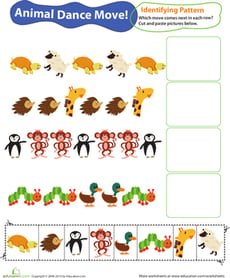Preschool Two-Dimensional Shapes Interactive Worksheets
About Preschool Two-dimensional Shapes Interactive Worksheets
On Education.com, preschool two-dimensional shapes interactive worksheets introduce young children to basic geometric concepts, helping them recognize, name, and compare shapes like circles, squares, triangles, and rectangles. These printable activities support foundational geometry learning and enhance shape recognition, fine motor skills, and visual discrimination.
This page offers a variety of shapes worksheets and interactive resources that classrooms or parents can use to engage children in hands-on learning. Materials include puzzles, coloring pages, cut-and-paste activities, and shape-matching exercises that make learning geometry fun and accessible for early learners.
Using these worksheets in home or classroom settings allows educators and parents to reinforce shape recognition while fostering interactive learning experiences. They provide an organized way to teach geometric concepts, practice skills, and set students up for success in math and spatial awareness.
This page offers a variety of shapes worksheets and interactive resources that classrooms or parents can use to engage children in hands-on learning. Materials include puzzles, coloring pages, cut-and-paste activities, and shape-matching exercises that make learning geometry fun and accessible for early learners.
Using these worksheets in home or classroom settings allows educators and parents to reinforce shape recognition while fostering interactive learning experiences. They provide an organized way to teach geometric concepts, practice skills, and set students up for success in math and spatial awareness.

